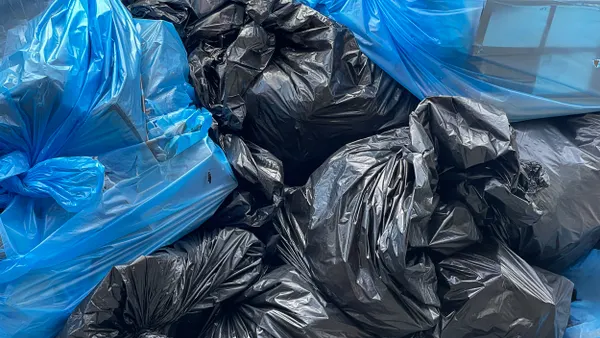Dive Brief:
- Since Chicago asked residents to keep plastic bags out of their recycling carts the city has seen a 22% drop in participation in certain areas. More than 180,000 carts have been declared contaminated this year and the city is considering new measures to get back on track, as reported by the Chicago Sun Times.
- On the Southeast side, where the recycling participation rate is 4.5%, Waste Management will be conducting a "back-to-basics" pilot program. Residents from 1,400 homes will only have to recycle paper, metal and glass. If successful, this could be expanded citywide on a temporary basis.
- Another idea is to incentivize better behavior by reducing the monthly collection fee that owners have to pay or getting local companies to donate coupons. Resource Management, the city's other recycling hauler, doesn't believe this will work and would prefer to see "some kind of fee" for contaminated bins instead.
Dive Insight:
Chicago's issues with the "bagless" program are the latest in a series of recycling challenges that include high contamination rates, recalcitrant landlords and aggressive squirrels. The city has seen its diversion rate drop from a recent high of 12% to about 9%. A new door-to-door education campaign and the distribution of "blue cart buddy" bags were announced earlier this month but apparently the city has decided that won't be enough.
The decision to scale back collection requirements is an interesting one as additional education will be needed later to get residents back up to speed on the full program if they start participating again. A related decision to suspend glass and plastic collection in New York during the early 2000s led to a sharp drop in the city's diversion rate that it still hasn't fully recovered from. Though Chicago's recent peak diversion rate is much lower than New York's was at the time, so the case could be made that more drastic action is needed.
As for the merits of incentives versus fees, few cities have cracked that code. One argument says that residents shouldn't be penalized if someone adds a contaminant to their bin after it's on the curb, while the other side says it's fair to charge fees to cover the cost of having to pick up contaminated carts separately. Various organizations are working on promising ideas to address contamination but they have yet to be tested on a citywide scale with millions of residents.











